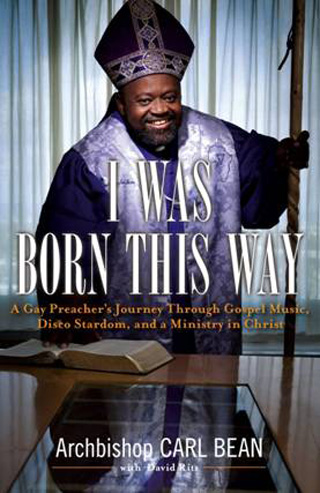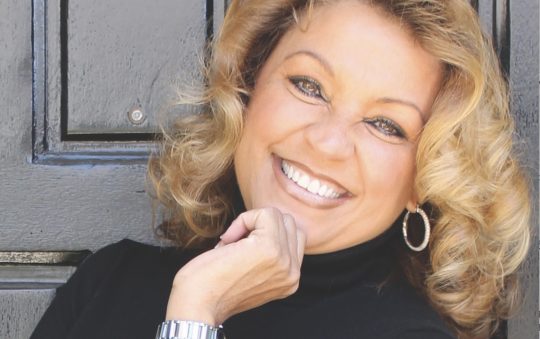
Bishop Carl Bean
Former Motown Recording Artist, Noted AIDS Activist, and Openly Gay Black Preacher Celebrates A New Book and 28 Years of Preaching God is Love, and Love is For Everyone at Unity Fellowship Church
Special to the L.A. Sentinel
By Jasmyne A. Cannick
Contributing Columnist
Carl Bean, 66, has come along ways since his days as foster youth in Baltimore, Maryland. Bean, who left his foster home in Baltimore at seventeen and took the bus to New York City, quickly found a home in Harlem’s churches. It wasn’t long before Bean started a career in singing gospel, first with the Alex Bradford Singers and later as a Motown recording artist. His 1977 dance hit single “I Was Born This Way” quickly became #1. Bean, who was openly gay became one of the first openly gay Black gospel singers signed to a major label-the biggest Black-owned record company at the time.
Today, Archbishop Carl Bean as he is more commonly known, is celebrating the release of his biography I Was Born This Way, now available in stores and online nationwide. In it, the gospel singer turned preacher, shares his extraordinary personal journey from Baltimore foster homes to the stage of the Apollo Theater and beyond all while being Black and openly gay.
“I was blown away,” Bean explains at the offer from publishing house Simon & Schuster. “I left the business 28 years ago. I’ve done nothing recording wise except for the church. But professionally since ‘I Was Born This Way’ I’ve done nothing. So when this came-and the advancement that they offered-I almost jumped out of the bed!”
The book, which has been well received by the black community in general, details Bean’s early life living in Baltimore including being molested at the age of three by his uncle until he was 11 under the constant threat of having his throat slit in his sleep.
“I was a three-year old trained to obey adults. Adults protected me, fed me, put me to bed. The concept of going against an adult was forbidden. Yet this adult raped me.”
Bean details his first crush at the age of 5 just after his foster grandmother affectionately referred to as Nana passed.
“I wasn’t even five when I fell in love with a boy with soft waves in his hair, eyes like, brown embers, coal black skin, and a smile that warmed my heart.”
At age seven, Bean says that he became a member of the Jackie Robinson Youth Council of the NAACP.
Throughout the book, Bean references the many familiarities shared by most Black families.
“Everyone knew I was gay, but it wasn’t an issue,” Bean explains. “Yes, I was effeminate but it wasn’t an issue in my family or in the neighborhood. Everyone knew I was just being me. The most physical thing I ever did was probably jump double-dutch.”
The young Carl Bean was in infatuated with the flamboyancy of the local drum majors.
He recalls a young female friend he had named Marie, whose parents both worked night shifts and had strict rules that boys were never allowed into the house after dark-except for Bean.
Later in the book, Bean chronicles a pivotal moment in his teenage years when at age 14, he is outed by one of the neighborhood boys whom he was having a relationship with and ensuing aftermath that took place when his parents confronted Bean’s parents and his first attempt at suicide.
At 17, Bean made his way to New York and began his career in gospel eventually being signed by Berry Gordy to record “I Was Born This Way,” for Motown, the biggest Black-owned record company. The song was an instant sensation broadcasting a statement on gender identity. It was the first gay liberation dance club hit.
At the height of his recording career, he worked with Dionne Warwick, Burt Bacharach, Miles Davis, and Sammy Davis Jr.
Bean made his way to Los Angeles where, after his music career, Bean’s life took a more serious focus as news articles started appearing describing an illness known back then as GRID, gay-related immune deficiency syndrome.
For him it all came together. His work on the Jackie Robinson Youth Council, the progressive theology he’d been taught, his work in the ministry of gospel, and his relationship with Jesus Christ all lead him to start the Minority AIDS Project (MAP), currently headquartered in Los Angeles on Jefferson Blvd. just west of La Brea Ave.
MAP was the first community based HIV/AIDS organization focused on the increasing
number of Blacks contracting the then relatively new virus HIV and AIDS. Back in 1985 he explains, there wasn’t any attention being paid to the many many black men who were dying from AIDS.
Bean and a handful of volunteers started MAP in the living room of a friend’s house and with the help of the Brotherhood Crusade and Danny Bakewell Sr. and Brenda Marsh-Mitchell, eventually moved into an office on Fairfax Ave. near Pico Blvd.
“I will never forget going to the Brotherhood Crusade’s offices on Slauson and asking for a meeting with Mr. Bakewell,” Bean remembers. “Mr. Bakewell’s door was open a little and he heard me mention the words HIV and AIDS and he came out and told Brenda to let me in. Brenda told me then and there it must have divine intervention and God’s will because it’s not everyday people walk in off the street and get a meeting with Mr. Bakewell.”
Other early supporters were then Assemblywoman Maxine Waters and comedian Richard Pryor.
Bean credits Pryor, who donated thousands of dollars on the condition of anonymity at the time, for really helping MAP get off the ground.
When Bean and his friends first started MAP he says they handled a caseload of 15 clients living with AIDS.
Today, MAP employs more than 44 full-time, part-time, and subcontracted bilingual staff and has over 200 volunteers to serve the needs of more than 1,200 clients living with HIV/AIDS per month. MAP also provides prevention services to over 12,000 individuals per year.
And as if all of that wasn’t enough for one lifetime, Carl Bean is also the founder of the Unity Fellowship Church Movement, a movement of churches nationwide for Black same-gender loving and transgender Christians. What started out in 1982 in the private residence of Bean on Cochran Ave. in Los Angeles with a few people, eventually moved to the Cockatoo Inn on Hawthorne Blvd. in Inglewood, then the Ebony Showcase Theatre on Washington Blvd. and finally into their own space on Jefferson Blvd., adjacent to MAP.
Celebrating 28 years of preaching, “God is love, and love is for everyone, the Unity Fellowship Church Movement boasts over 15 churches nationwide where Black same-gender loving people can come together to worship and praise God, the newest addition being in Charleston, South Carolina.
Bean shows no signs of slowing down at 66, and when asked about whether there’s a part two in the works on the story of his remarkable life and career, he hints that may already be on the way.






